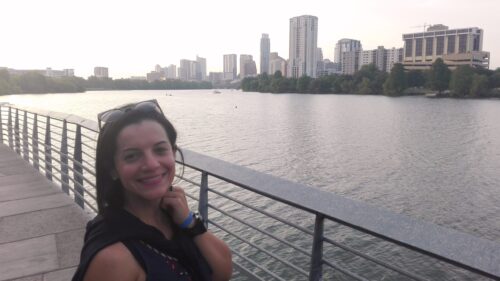USAID Urban Champion: Montserrat Acosta

Montserrat Acosta is a Climate Change Adaptation Specialist at the USAID Mission in the Dominican Republic, where she is originally from. She manages the CLIMA program that consists of improving the capacity of municipalities in participatory urban planning environmental adaptation. She has a background in economics and a Ph.D. from The Ohio State University in Agricultural, Environmental, and Development Economics where she specialized in the estimation of the costs of climate change abatement.
How is urbanization impacting USAID’s work in the Dominican Republic? What planning challenges or opportunities does it present?
In the DR, land use planning is not customary, that is, the development that exists has not always occurred in an organized fashion. Currently in the DR, USAID works on three general areas with an overall goal to improve citizen security: improve community resilience; improve health with a specific focus on Zika and HIV/AIDS; and strengthen crime prevention. Thus, the current issues around urban planning directly affect each of USAID’s development objectives.
For example, Zika is carried by the same mosquito that carries dengue. An increase in precipitation, combined with poor urban planning that leads to inadequate storm water sewage systems so that water stagnates for long periods of time, leads to a rise in the aedes aegypti mosquito, thus higher Zika incidence. However, USAID/Dominican Republic is working closely with the Ministry of Economy, Planning, and Development in their current urban and land use planning initiatives for the country. The Ministry has developed two bills that are in Congress: Bill for Unique Regions (dividing the country in planning regions) and Bill for Terrestrial Zoning.
Tell us about some of USAID’s urban projects in the DR.
The CLIMA portfolio is comprised of four programs working in four municipalities that includes the National District, Santiago (the second largest city), San Pedro de Macoris, and Las Terrenas. The largest one, the Planning for Climate Adaptation Program, is implemented by the International City/County Management Association (ICMA) working with municipal officials, community-based organizations, the private sector, and relevant stakeholders in mainstreaming climate change considerations into participatory urban and land use planning and managing climate risk. It includes an activity to develop DR-specific climate change analyses and models at the municipal level (heat index, drought, precipitation and downscaled climate models), as well as improve the access and dissemination of climate information.
CLIMA is also working on strengthening the capacity of the Dominican Federation of Municipalities (FEDOMU) to lead the effort to scale up this inclusive urban and land use planning methodology to four more municipalities. In addition, ICMA is facilitating learning among cities through city-to-city partnerships and developed certificate courses on different aspects of resilience for the target population.
In addition, there are two activities that are implementing small-scale, green infrastructure in impoverished neighborhoods in the municipalities to increase the resilience of the community.
What do you see as important trends shaping the future of urbanization? What will USAID’s role be moving forward?
More focus on integration between the different sectors in an urban environment. Urban planners and citizens are tackling the issues of urbanization in a comprehensive manner, looking at all the activities that take place as well as the needs of residents. USAID’s role is to integrate and coordinate their projects so that development issues are approached in a similar comprehensive manner.
USAID’s Land and Urban Office is looking to feature Urban Champions throughout the Agency who recognize the impact urbanization has on global development today and into the future.
You can nominate anyone (or yourself!) who:
- Has a project with an urban focus in their portfolio
- Has worked on project design that includes interventions in urban areas
- Has an academic or research background in urbanization
- Is passionate about the challenges urbanization presents.
To nominate someone, email info@urban-links.org and let us briefly know why your nominee deserves to be featured.

